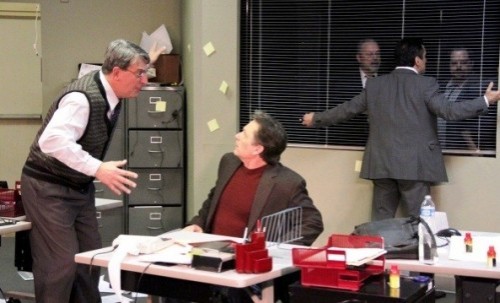Mamet's Glengarry Glen Ross in Colorado
The Edge Theater Presents a Daring Take
By: Susan Hall - Feb 21, 2012
Glengarry Glen Ross
By David Mamet
Directed by Robert Kramer
Sets and Light Design by Kelly Westback
Cast: Paul Page (Levene), James O’Hagan-Murphy (Williamson), Richard Cowden (Moss) Verl Hite (Aaronow), Rick Yaconis (Roma), Michael Ingram (Lingk), Amanda Holter (Woman), Ryan Goold (Bayden).
The Edge Theatre Company
Lakewood, Colorado
February 18, 2012
Glengarry Glen Ross by David Mamet got a terrific production at the Edge Theatre Company, an adventuresome new group in Lakewood, Colorado. Dedicated to providing actors with an opportunity to strut their stuff in important plays, their season includes familiar fare and some regional premiers. Rick Yaconis, the executive and artistic director, is committed to working at the edge, boldly taking big risks.
Yaconis was featured in this edition of Glengarry Glen Ross as Roma. He looks like Al Pacino who was nominated for a supporting actor Oscar when he played the role on film. Yaconis compares favorably as the hyper sleazy salesman leaping and creeping across the stage, always looking for an advantage.
The key character is Shelly Levene, an old guard salesman down on his luck. Paul Page as Levene moved from desperate offers to an office manager on salary, not under the pressure of commissions, to solving his problems any way he can, blustering, bragging and berating as he is driven by fear.
The story line is familiar as this is Mamet’s most often performed play. The language and its poetic sound, is now the lingua franca of big business. Unless the Human Resources division of a company bans ‘fuck’ from offices and restrooms, driven young business people pick up Mamet’s phrases as their own. Winning the Cadillac becomes 'a steel pen' in big law firms where, if you get second or third in the competition, you are fired.
In case you hear these phrases all the time and don’t know where they come from: “A-B-C. A-Always, B-Be, C-Closing. Always be closing, always be closing.”
“What the hell are you? You're a fuckin' secretary. Fuck you. That's my message to ya: fuck you and you can kiss my ass.”
Putting on the play is dangerous, but it is the kind of danger Yacounis relishes. In the Edge production, the familiar seems new. You think again about the world in which we live. Everyone is still a salesman, and Mamet’s take is one we are surely going to recognize for a long time. Director Robert Kramer sucked us in even as the words often drive us away. It's a neat trick.
If the ‘fucks’ seem over the top, the fear and the drive from which they erupt are not. Only in Margin Call, a brilliant and much-overlooked film, does J. C. Chandor, the son of an man employed by Merrill Lynch for 40 years, create a different language. Chandor strips words of all feeling. The only language left is about making money; cold, pure, simple. Mamet is hopeful, because there is feeling in his words. It would be hard to say 'fuck' without feeling.
All the performers at the Edge capture the raw desire to close. James O’Hagan-Murphy as Williamson plays the only character who is deliberately flat, although he does muster a searing ‘fuck you’ when he takes Levene down. Richard Cowdon as Moss makes you rethink the meaning of ‘talk’ and ‘listening.’ He implicates a lost Aaronow, played with an unusual subtly by Verl Hite, when he tells him: “You’re out…you are guilty.” “Why?” asks Aaronow. “You listened.”
Michael Ingram and Ryan Goold were also excellent. And Amanda J. Holter deserves a bow for bravely prancing into a men’s world and leaving a calling card.
The staging, particularly of the second act has so much is going on behind Venetian blinds. You sense another dimension without actually knowing what is happening. The execution was first rate. Before the second act begins, and yet very much part of the drama, stagehands come in and tear the office apart in front of the audience coming back from coffee and free chocolates. A robbery has just occurred, it's tsunami before our eyes and before the action.
Five productions follow and the season ends in December with a festival of new plays. It is well worth a trip to the Edge.




